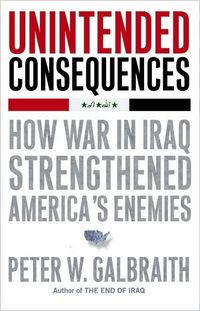

Purchase
How War in Iraq Strengthened America's Enemies
Simon & Schuster
October 2008
On Sale: September 30, 2008
224 pages
ISBN: 1416562257
EAN: 9781416562252
Hardcover
Add to Wish List
Non-Fiction Political
Called by New York Times columnist David Brooks
the "smartest and most devastating" critic of President
George W. Bush's Iraq policies, Peter Galbraith was the
earliest expert to describe Iraq's breakup into religious
and ethnic entities, a reality now commonly accepted.
The Iraq war was intended to make the United States more
secure, bring democracy to the Middle East, intimidate Iran
and Syria, help win the war on terror, consolidate American
world leadership, and entrench the Republican Party for
decades. Instead, Bush handed Iran its greatest strategic triumph in four
centuries
U.S. troops now fight to support an Iraqi government led by
religious parties intent on creating an Iranian-style
Islamic republic
As part of the surge, the United States created a Sunni
militia led by the same Baathists the U.S. invaded Iraq to
overthrow administration gave Iran and North Korea a free
pass to advance their nuclear programs
Obsessed with Iraq's nonexistent WMD, the Bush
administration gave Iran and North Korea a free pass to
advance their nuclear programs
Turkey, a key NANATO ally long considered a model pro-
Western Muslim democracy, became one of the most anti-
American countries in the world
U.S. prestige around the world reached an all-time low
Iraq: Galbraith challenges the assertion that the surge
will lead to victory. By creating a Sunni army, the surge
has, in fact, contributed to Iraq's breakup and set the
stage for an intensified civil war between Sunnis and
Shiites. If the United States wishes to escape the Iraq
quagmire, it must face up to the reality that the country
has broken up and cannot be put back together. Iran: Having helped Iran's allies take control in Baghdad,
the Bush administration no longer has a viable military
option to stop Iran's nuclear program. Galbraith discusses
how a president more pragmatic than Bush might get Iran to
freeze its nuclear program as part of a package deal to
upgrade relations between two countries equally threatened
by Sunni extremism. Turkey, Syria, and Israel: A war intended to make Israel
more secure, undermine Syria's Assad regime, and strengthen
ties with Turkey has had the opposite result. Nationalism: In the coming decades, other countries may
follow Iraq's example in fragmenting along ethnic and
religious lines. Galbraith draws on his considerable
experience in Iraq and the former Yugoslavia to predict
where and what the United States might do about it. The United States: George W. Bush substituted wishful
thinking for strategy and as a result made America weaker.
Galbraith provides some rules for a national strategy that
will appeal equally to conservatives and liberals --
indeed, to anyone who believes the United States needs an
effective national security strategy.
Comments
No comments posted.
Registered users may leave comments.
Log in or register now!
| 


 © 2003-2024 off-the-edge.net
all rights reserved Privacy Policy
© 2003-2024 off-the-edge.net
all rights reserved Privacy Policy